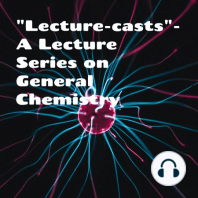17 min listen

"Lecture-casts"- A Podcast Lecture Series in Chemistry- Continued Fundamentals in American Sign Language- Video on Spotify and Anchor!
"Lecture-casts"- A Podcast Lecture Series in Chemistry- Continued Fundamentals in American Sign Language- Video on Spotify and Anchor!
ratings:
Length:
7 minutes
Released:
Mar 7, 2023
Format:
Podcast episode
Description
General chemistry involves the study of matter, which is made of atoms which can be understood using very small particles.
Those small particles can be electrons, neutrons or protons or even smaller. Chemical reactions involve those changes are dependent on reactant balance, rate, nearness, and position. Bonding influences properties and rate, nearness, position and reactant balance are related. In chemistry when we describe a substance, we talk about its properties. Two types of properties are physical and chemical. Chemical properties are linked to the bonding between the atoms, but physical properties are linked to the appearance, smell, melting point and others.
Physical changes are associated with physical properties, and chemical changes are associated with chemical properties are associated with chemical changes. Physical changes can be reversed but chemical changes cannot be reversed. A chemical reaction changes the chemical properties of a substance or forms a new substances, reactants make products. It is like ingredients combine and make a new substance. Now, there are four states of matter solid, liquid, gas and plasma. According to the “kinetic molecular theory”, solids are densely packed with particles, liquids are loosely packed and gases have a lot of space between their particles. This is why gases spread out or diffuse rapidly. Solids changing to liquids is called melting. Liquids to gases is called evaporation. Gas to solid is called deposition and solid to gas is called sublimation. These are phase changes. Chemistry is important and for anyone who is interested and has the passion, we will ensure that we help to create access for all interested. Never give up! Keep trying! You can do it!
Those small particles can be electrons, neutrons or protons or even smaller. Chemical reactions involve those changes are dependent on reactant balance, rate, nearness, and position. Bonding influences properties and rate, nearness, position and reactant balance are related. In chemistry when we describe a substance, we talk about its properties. Two types of properties are physical and chemical. Chemical properties are linked to the bonding between the atoms, but physical properties are linked to the appearance, smell, melting point and others.
Physical changes are associated with physical properties, and chemical changes are associated with chemical properties are associated with chemical changes. Physical changes can be reversed but chemical changes cannot be reversed. A chemical reaction changes the chemical properties of a substance or forms a new substances, reactants make products. It is like ingredients combine and make a new substance. Now, there are four states of matter solid, liquid, gas and plasma. According to the “kinetic molecular theory”, solids are densely packed with particles, liquids are loosely packed and gases have a lot of space between their particles. This is why gases spread out or diffuse rapidly. Solids changing to liquids is called melting. Liquids to gases is called evaporation. Gas to solid is called deposition and solid to gas is called sublimation. These are phase changes. Chemistry is important and for anyone who is interested and has the passion, we will ensure that we help to create access for all interested. Never give up! Keep trying! You can do it!
Released:
Mar 7, 2023
Format:
Podcast episode
Titles in the series (71)
Lecture-casts: A Lecture Series in General Chemistry - Advanced Topics- Snapshot Lectures in Chemistry- Reaction Kinetics by "Lecture-casts"- A Lecture Series on General Chemistry